- News
- Reviews
- Bikes
- Components
- Bar tape & grips
- Bottom brackets
- Brake & gear cables
- Brake & STI levers
- Brake pads & spares
- Brakes
- Cassettes & freewheels
- Chains
- Chainsets & chainrings
- Derailleurs - front
- Derailleurs - rear
- Forks
- Gear levers & shifters
- Groupsets
- Handlebars & extensions
- Headsets
- Hubs
- Inner tubes
- Pedals
- Quick releases & skewers
- Saddles
- Seatposts
- Stems
- Wheels
- Tyres
- Tubeless valves
- Accessories
- Accessories - misc
- Computer mounts
- Bags
- Bar ends
- Bike bags & cases
- Bottle cages
- Bottles
- Cameras
- Car racks
- Child seats
- Computers
- Glasses
- GPS units
- Helmets
- Lights - front
- Lights - rear
- Lights - sets
- Locks
- Mirrors
- Mudguards
- Racks
- Pumps & CO2 inflators
- Puncture kits
- Reflectives
- Smart watches
- Stands and racks
- Trailers
- Clothing
- Health, fitness and nutrition
- Tools and workshop
- Miscellaneous
- Buyers Guides
- Features
- Forum
- Recommends
- Podcast
review
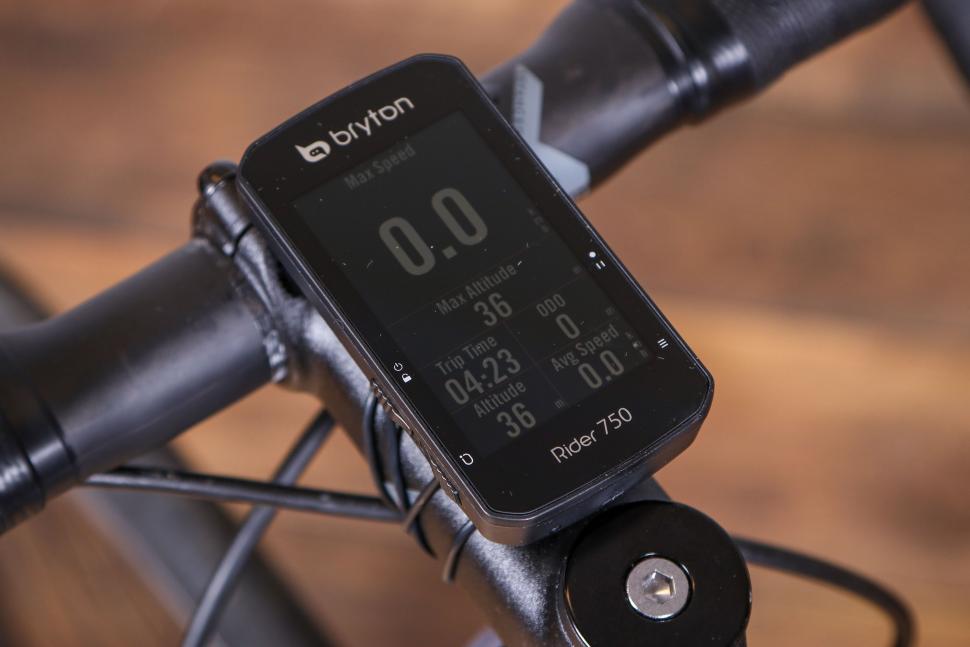 2021 Bryton Rider 750T GPS Cycle Computer Bundle With Speed-Cadence & Heart Rate Monitor.jpg
2021 Bryton Rider 750T GPS Cycle Computer Bundle With Speed-Cadence & Heart Rate Monitor.jpg£299.99
VERDICT:
Thoroughly impressive unit and app at a price that might outweigh the slow processing and unrefined map graphics
Voice-activated navigation
Good app integration
Interplay with broad range of other apps
Colour touchscreen
Slow processing
Inferior map graphics compared with competitors
Weight:
182g
Contact:
At road.cc every product is thoroughly tested for as long as it takes to get a proper insight into how well it works. Our reviewers are experienced cyclists that we trust to be objective. While we strive to ensure that opinions expressed are backed up by facts, reviews are by their nature an informed opinion, not a definitive verdict. We don't intentionally try to break anything (except locks) but we do try to look for weak points in any design. The overall score is not just an average of the other scores: it reflects both a product's function and value – with value determined by how a product compares with items of similar spec, quality, and price.
What the road.cc scores meanGood scores are more common than bad, because fortunately good products are more common than bad.
- Exceptional
- Excellent
- Very Good
- Good
- Quite good
- Average
- Not so good
- Poor
- Bad
- Appalling
The Bryton Rider 750 offers everything that you could want from a GPS unit – colour touchscreen, app integration and on-board navigation, at a price that significantly undercuts its competitors. Even with one or two minor niggles, mainly relating to the user interface, it's difficult to be negative, particularly if your focus is to log riding stats and sync with other platforms; it does this as well as any other premium unit.
The Rider 750 replaces Bryton's 860 as its flagship unit and is available in two package options – the Rider 750E and the Rider 750T.
The 750T, on test here, is the bells and whistles bundle; in addition to the 750E's USB cable, two bike mounts and safety lanyard, you get an ANT+/Bluetooth heart rate monitor, ANT+/Bluetooth cadence sensor, and ANT+/Bluetooth hub speed sensor. Both packages come with the same Bryton Rider 750 head unit.
The no-frills bundle will set you back £249.99, the full package, £299.99.
Unit and mounting
The computer comes with a standard twist-fit bracket and a range of different sized rubber o-rings.
There's a sleek-looking, durable, aluminium, out-front (31.6mm) mount too. The brackets have a firm hold and distinct 'click' when the unit is in place.
The 750 fits in both the old and new Garmin mounts that I own, though it's not a perfect fit – there's no 'click' at the vertical position. The reverse isn't so; the Garmin won't go in the Bryton mount.
The unit itself is a decent size – 92.3 x 49.4mm with a 2.8in touchscreen. It could be a little more compact – the logos at the top and bottom add unnecessary length, in my opinion, which could be an issue if you are mounting it on the stem – but it still looks pretty slick on the bike.
The unit itself weighs just shy of 100g (the whole bundle 182g), slightly heavier than Garmin's Edge 830. Alongside the latter, it looks a bit chunky.
The buttons (two either side) are easy to locate and activate, but the charging port could be better placed, particularly for anyone hoping to charge on the go (endurance bikepackers, perhaps) as it sits under the unit.
It doesn't seem ideal in terms of exposure to the elements either, especially as the port cover on ours, a rubbery tab that slots in place, is already 'curling' at a corner. That said, the Bryton does come with an IPX7 waterproof rating, so should withstand atrocious conditions.
Battery life
Bryton claims an impressive battery life of up to 20 hours; I didn't get that, but like most GPS units, the more functions you use and the more you interact with it, the quicker the battery drains. It's certainly got a decent life with just the basic sensors on the go – HR and cadence, and without navigation. I would get in four two- to three-hour rides and think to charge it, but it wasn't necessary.
Annoyingly, there's no percentage indicator for the amount of life left in the battery. Even when charging, it doesn't show the capacity it's at.
Setting up and sensors
For someone who's been conditioned to a Garmin for several years, the Bryton took some getting used to. It's been worth the effort to discover its full capabilities. Bryton has some great videos on its YouTube channel that I'd point any new owners to.
Setting up the Bryton Active App is a must from the word go – you can do loads from there. At first I found it slightly more intuitive and efficient than using the unit, but over time I've got accustomed to changing settings on the unit; it's simply a matter of familiarity.
All the supplied sensors are easy to pair with the Rider 750, and equally easy to install. The on-screen prompts are great.
The hub-style speed sensor (6g) comes with a flexible rubber band attachment to fit all manner of hubs. The cadence sensor (6g) is slim and comes with a soft rubber backing to stay in place without marking the crankset.
The HR strap isn't the best quality – the actual fabric feels pretty flimsy, and creases and folds, while the plastic clip-on element is rather chunky and cheap looking. Transmission has dropped out on a few occasions when riding, but no worse than any other monitor I've used in the past.
The 750 picks up a signal pretty quickly. It never beat the Garmin 830 when starting up on my driveway, but it was only ever a second or two behind. It uses GPS, Glonass, Galileo, Beidou and QZSS satellite support; you can make your own selection based on your location – a great feature if you are planning to travel with the 750.
I found that under the cover of trees there was frequently a lag in the speed sensor, something that the Garmin 830 didn't suffer from. In general, the processing is a little sluggish.
Touchscreen
There's a lag in the 750's touchscreen which became more obvious when I was testing the Garmin 830 alongside it; it simply doesn't respond instantaneously like the Garmin, or indeed a smartphone.
On occasion, I've had to swipe twice to move screens, and when trying out thick winter gloves with it, it certainly missed swipes. An intended swipe is frequently picked up as a tap, which actually brings up a sensor status screen. (The buttons up the side can be used to cycle through screens too – as well as stop/start/pause, lap/reset, lockscreen...)
Profiles
Once everything is up and running, you can start to tailor the Rider 750 to suit your needs. There are three different bike profiles to name and customise. Each profile can have up to four data pages, plus a map and elevation screen. There are eight different grid arrangements available for data display, with a minimum of two and a maximum of 12 fields; there are in excess of 85 different metrics.
I found two pages for my main road bike, along with the map, sufficient. With six data fields on one screen things weren't too overwhelming and I could easily read all the fields. All of this can be customised directly on the unit or in the app.
GUI
The Graphical User Interface is a unique addition to the unit, and looks seriously smart, though I'd question its usefulness while riding on the road; I like to keep my wits about me and prefer a quick glance at a number rather than an attempt to assimilate a pretty ring of colours. I can see how it would come into its own for indoor training. I haven't tested the unit for indoor training, or indeed synced any kind of power meter – the GUI can be used with speed, power, cadence and HR.
The colour screen is pretty vibrant, but even on full brightness the contrast doesn't match that on the Garmin 830. That said, I had no trouble reading it. Riding in bright sunlight definitely makes it harder to read, though not impossible – I could still see what I wanted to, including the map.
I didn't warm to the auto-pause icon. While very visible, it obscures the screen – it was annoying if I wanted to read the map while static, for example. I'd prefer something more akin to the amber frame that the Garmin 830 uses.
Apps
As I mentioned, having the Bryton Active App is vital. Once installed, you can link to mainstream third party apps. Once the app is up and running, transferring data to and from the device is quick and seamless. When rides have been downloaded, you can access all the data and relevant graphics in the app without issue, no manuals needed. I'd say in-app data collation and summary is first rate.
If you don't want to use the Bryton Active App (for ride analysis), you can link TrainingPeaks, Strava and/or Komoot. Syncing rides with these third party apps happens the instant they are uploaded to the Bryton Active App.
The app has never crashed on me and I never had issues with (full) data not syncing to TrainingPeaks, Strava or Komoot. The only omission is that the unit doesn't entertain Strava Live segments in the same way as a Garmin or Wahoo do.
Navigation
I actually had to load a map onto the 750, from the Bryton website – there were plenty of other countries, but no UK map. The Bryton website has full, easy-to-follow instructions and I had a map on there in less than 10 minutes.
While the map is clear enough, the graphics look pretty outdated, especially in comparison to the Garmin 830.
It's worth noting that the map will not colour a trail of the roads that you have been on, in either free-riding or navigation modes. I use a GPS mapping screen a lot when touring – being able to see where I've ridden has been pretty vital on some tours, so not having a record of where I've come from on the screen at any given time is a real negative of the 750 for me.
I contacted Bryton about this; I was struggling to believe that there isn't a setting to change it. The prompt response was: 'This is not something that is currently offered but this is being looked into and developed. We expect (all going well) this to be released in an update by the end of the year.'
You can plan routes in the app (think waypoint plotting), or import them from the linked apps to upload to the unit. All of this is pretty intuitive and works as well as it does with the Garmin 830.
If you are following a planned route and happen to stray off course, the unit doesn't re-route you.
> GPS cycle route planning made easy – how to plan and follow a bike route
A unique feature to the 750 is the voice-activated navigation. I've found it pretty reliable, credit to the unit – I'm a northerner; it's picked up some tricky place names like 'Miserden' and 'Bishop's Cleeve'. I can't say that it always took me to destinations via roads I'd have opted for myself, but it would get me there. Equally, it has taken me on some lanes I didn't even know existed, so it's not always going for the most direct route. These were destinations close by and the processing time wasn't too lengthy – a minute at most. Out of interest, I asked it to take me to York from my home in Gloucestershire, and within 10 seconds it had a 273km route plotted – impressive. No, I haven't followed it, yet.
For any kind of on-board navigation – voice or a typed-in destination (via the unit or app) – the app needs to be active (with an internet connection); if it's not, you'll keep getting a pop-up reminder. The unit will re-route with this kind of unplanned navigation (provided the app remains active), and I was impressed by the speed at which it did this if I'd wandered off-course.
There’s more, if you want it...
Bryton claims that the 750 will connect not only to smart trainers (via ANT+ FE-C for power control of your trainer and upload of virtual rides), but that it also supports electronic gear-shifting systems 'including Shimano's Di2, SRAM's eTap and Campagnolo's EPS. Gear information, such as gear ratio, gear combo and even battery life (such as on the ESS), are displayed immediately on the Rider 750.'
There's even more: 'It incorporates Shimano Steps and ANT+ LEV e-bike support for compatible brands to display various e-bike data, including assist mode, assist level shifting mode, E-Bike battery, travel range and rear gear position.'
> 13 of the best cycling GPS units – get ride data and bike satnav from £50
I have it on good authority that it connects to the Garmin Varia Radar System too. I haven't tested any of these features myself but, based on the linking and syncing performance that I have, I'd have faith in its capabilities and reliability.
Just like some of the upper end Garmin and Wahoo devices, using Bluetooth Smart wireless technology, the Rider 750 can receive phone call, text and email notifications.
Value
The 750T Bundle is very modestly priced at £299.99. By comparison, the equivalent bundle with the Garmin Edge 830 has an RRP of £429.99. Wahoo's Elemnt Roam doesn't come with sensors, so its £299.99 price tag can only be fairly compared with the Rider 750E, which has an RRP of £249.99. Take out the sensors from the Garmin 830 bundle and you'll pay £349.99. In short, Bryton isn't being beaten on price.
Conclusion
Even considering all of the niggles that I've mentioned, the Bryton Rider 750 is a one hell of a package for the price. I struggled with the lack of processing oomph and outdated mapping, but this won't be at the top of everyone's priority list. Integration with the Bryton Active App and all third party apps has been, in my experience, flawless. Throw in all of the pairing opportunities with sensors, systems and smart trainers for under £300, and it's easy to see why many riders will happily overlook the unrefined mapping and slightly less power processing.
Verdict
Thoroughly impressive unit and app at a price that might outweigh the slow processing and unrefined map graphics
road.cc test report
Make and model: Bryton Rider 750T GPS Cycle Computer Bundle
Size tested: n/a
Tell us what the product is for and who it's aimed at. What do the manufacturers say about it? How does that compare to your own feelings about it?
Bryton says, 'Designed for demanding cyclists looking for powerful new features and technologies, the all new Rider 750 excites with pre-loaded maps for online navigation and a range of advanced training features well beyond it's price tag. The Rider750 also includes new features such as the Bike Radar System and full support for smart trainers bikes as well as compatibility with all of your Bluetooth and ANT+ sensors including all brands of Power meters. With an interactive graphical user interface (GUI) with easy-to-understand icons on a bright 2.8-inch colour touch screen, the Rider 750 offers a compelling user experience. It combines powerful features such as online navigation with pre-loaded maps of the most important regions and address entry by voice command with new technologies such as ANT+ FE-C (Fitness Equipment Control) for smart exercise bikes, 3 highly customizable bike profiles and support for Bike Radar systems. Furthermore, the Rider 750 E is compatible with SHIMANO Steps and can show the status of your e-bike on the display.'
Tell us some more about the technical aspects of the product?
From Bryton:
The Rider 750 T bundle comes packaged with an additional Bluetooth/Ant+ Heart Rate Monitor + Speed & Cadence sensors in the box.
Features:
2.8-inch colour touch screen with graphical user interface (GUI)
Online navigation with OSM
Online search by voice command
Google fuzzy search
Downloadable world maps
Route tracking with POI/peak information
Indoor trainer compatible with ANT+/FE-C connectivity to give control of the Smart trainers
Virtual ride simulation
Training with TrainingPeaks
3 quickly changeable profiles
Automatic sensor scan
Wireless connections - BLE/ANT+/ANT+ FE-C / WLAN
ESS support
Support of Bike Radar Systems
Support for e-bike (Shimano Steps)
In the Box
Rider 750 Main Unit
USB Cable
Bike Mount + Sport Out Front Mount
Bluetooth/Ant+ Heart Rate Monitor & Strap
Bluetooth/Ant+ Speed Sensor
Bluetooth/Ant+ Cadence Sensor
Safety Lanyard
Quick Start Guide
Rate the product for quality of construction:
8/10
Unit itself is tidy enough, if not as slick as some more expensive competitors.
Rate the product for performance:
7/10
Excellent app integration with great analysis. Good on-board navigation. Processing speed doesn't match that of some competitor units, with lags in touchscreen response and map loading.
Rate the product for durability:
8/10
Unit seems sturdy enough.
Rate the product for weight (if applicable)
8/10
Perfectly acceptable for its size.
Rate the product for value:
8/10
Tell us how the product performed overall when used for its designed purpose
Reliable recording, syncing and analysis of data in both Bryton's own app and mainstream third party apps. Decent navigation functions, both onboard and in-app or third party synced. Niggles are only with processing speed; it always gets there though.
Tell us what you particularly liked about the product
Reliable integration with Bryton Active App and third party apps.
Tell us what you particularly disliked about the product
Lack of coloured trail on map and slow processing/lag in swiping. The pause icon was also a little annoying; although very visible, it obscured the screen – not great if you still want to read the map.
How does the price compare to that of similar products in the market, including ones recently tested on road.cc?
It undercuts all comparable units from leading competitors. Both Garmin and Wahoo are considerably more. Sigma's Rox Sport 12.0 is not overpriced at £349.99, but you may struggle to get your hands on one of these at the moment.
Did you enjoy using the product? Yes
Would you consider buying the product? Yes
Would you recommend the product to a friend? Yes
Use this box to explain your overall score
The Rider 750T is an impressive bundle for the price. It's reliable in syncing with the Bryton app and third parties, boasts some decent navigation functions and a whole range of other features. There's no escaping the lack of refinement with regards to the mapping and processing, but it's difficult to be too negative about these things when it does everything else so well.
About the tester
Age: 42
I usually ride: Road My best bike is: Carbon road.
I've been riding for: Over 20 years I ride: Most days I would class myself as: Expert
I regularly do the following types of riding: commuting, touring, club rides, general fitness riding, Getting to grips with off roading too!
Emma’s first encounters with a road bike were in between swimming and running. Soon after competing for GB in the World Age Group Triathlon Championships in Edmonton in 2001 she saw the light and decided to focus on cycling.
After a couple of half decent UK road seasons racing for Leisure Lakes, she went out to Belgium to sample the racing there and spent two years with Lotto-Belisol Ladies team, racing alongside the likes of Sara Carrigan, Grace Verbeke, Rochelle Gilmore and Lizzie Deignan. Emma moved from Lotto-Belisol to Dutch team Redsun, then a new Belgian team of primarily developing riders, where there was less pressure, an opportunity to share her experience and help build a whole new team; a nice way to spend her final years of professional racing.
Since retiring Emma has returned to teaching. When not coercing kids to do maths, she is invariably out on two wheels. In addition to the daily commute, Emma still enjoys getting out on her road bike and having her legs ripped off on the local club rides and chain gangs. She has also developed an addiction to touring, with destinations including Iceland, Georgia and Albania, to mention just a few. There have also been rare sightings of Emma off-road on a mountain bike…
Latest Comments
- Pub bike 20 min 42 sec ago
Maybe it is the latest ruse for insurers to avoid payouts saying "You didn't tell us that you took the key out of the lock so we're refusing your...
- thrawed 30 min 58 sec ago
Even if there was a cycle lane in there, as it would be shared with motor traffic all the exhaust fumes would probably take years off your life if...
- Pub bike 36 min 36 sec ago
That idea has gone out of the window. The new idea is that if you see a cyclist you honk your horn and watch what happens. It ended very badly in...
- KDee 3 hours 40 min ago
I'm still running an ELMNT BOLT V1, and I've never really understood the LED's. I'm sure I configured them for HR zones, but never really look at...
- chrisonabike 3 hours 42 min ago
Mostly agree. Although ... high level sport is complicated. It's not wrestling exactly, but there sometimes seems to be more than a little...
- David9694 4 hours 47 min ago
It just seems a lot of trouble to go, doesn't it. If you are into building stuff like this perhaps some system where the vehicle brings you to...
- don simon fbpe 5 hours 5 min ago
Why is this not the will of god?
- hawkinspeter 8 hours 8 min ago
PKD foresaw it, though his novel was based on a different outcome of WWII, not the precursor to WWIII. Maybe the Idiocracy film is a closer fit?
- OnYerBike 10 hours 11 min ago
@Sredlums: I'm not sure I follow your logic. If someone grabs your helmet twists it, then the reason it doesn't feel good is because the outer is...
- Rapha Nadal 10 hours 11 min ago
Coming to the mid-paced Saturday club ride soon.



















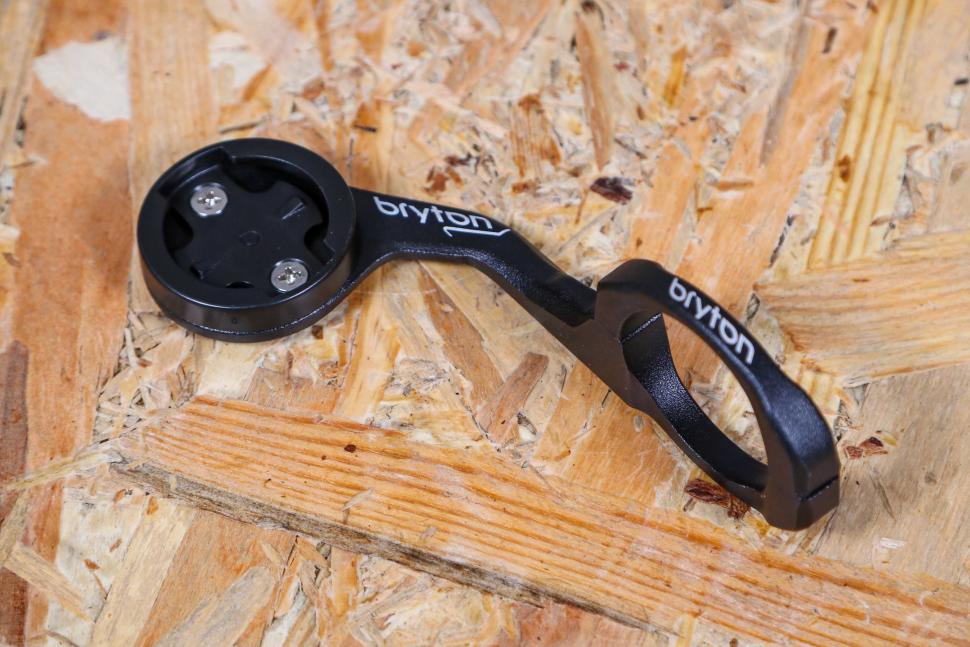
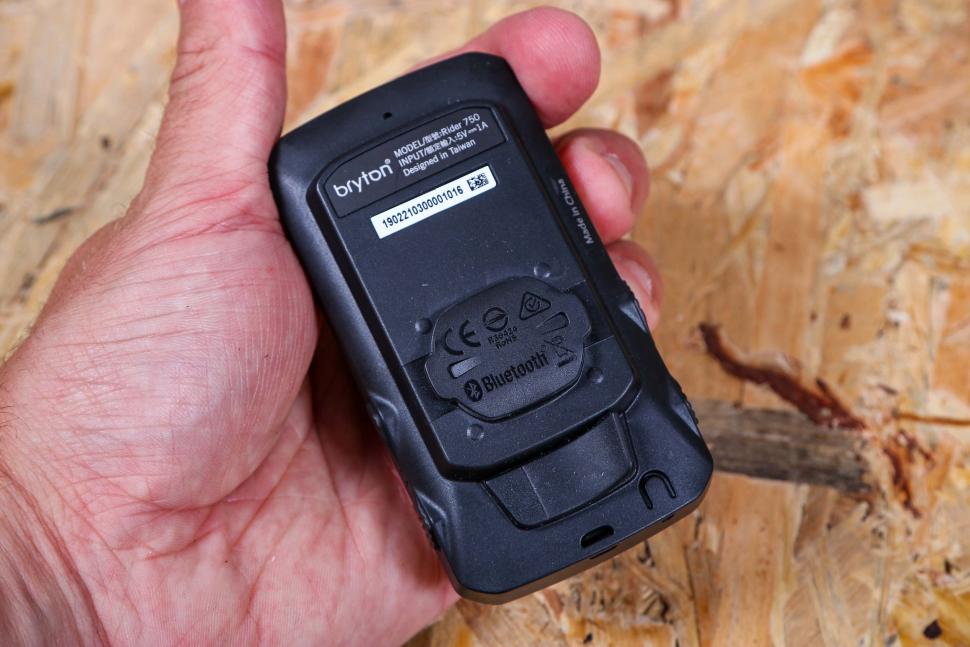
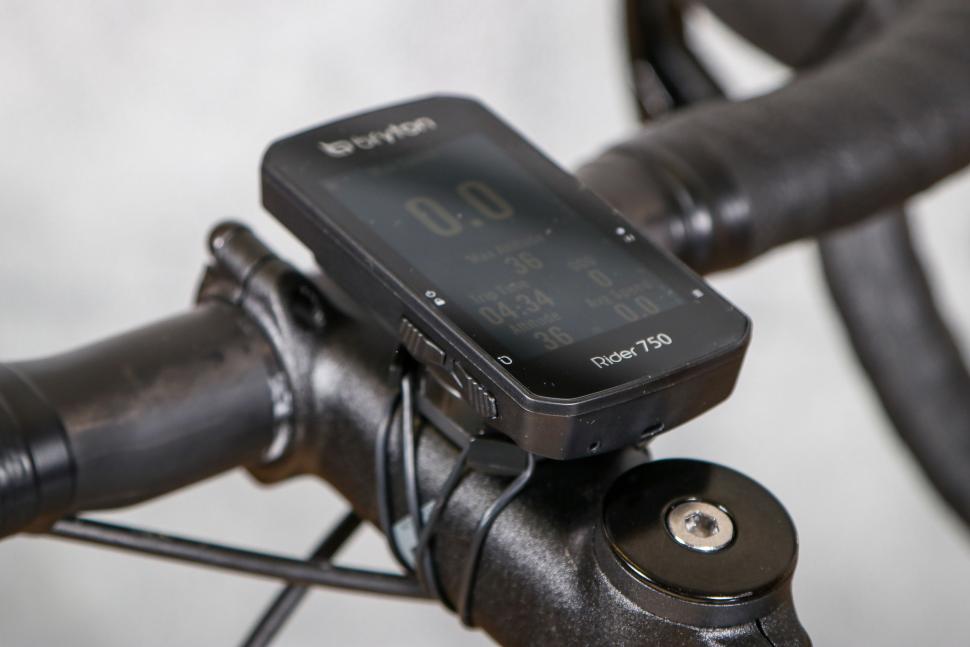
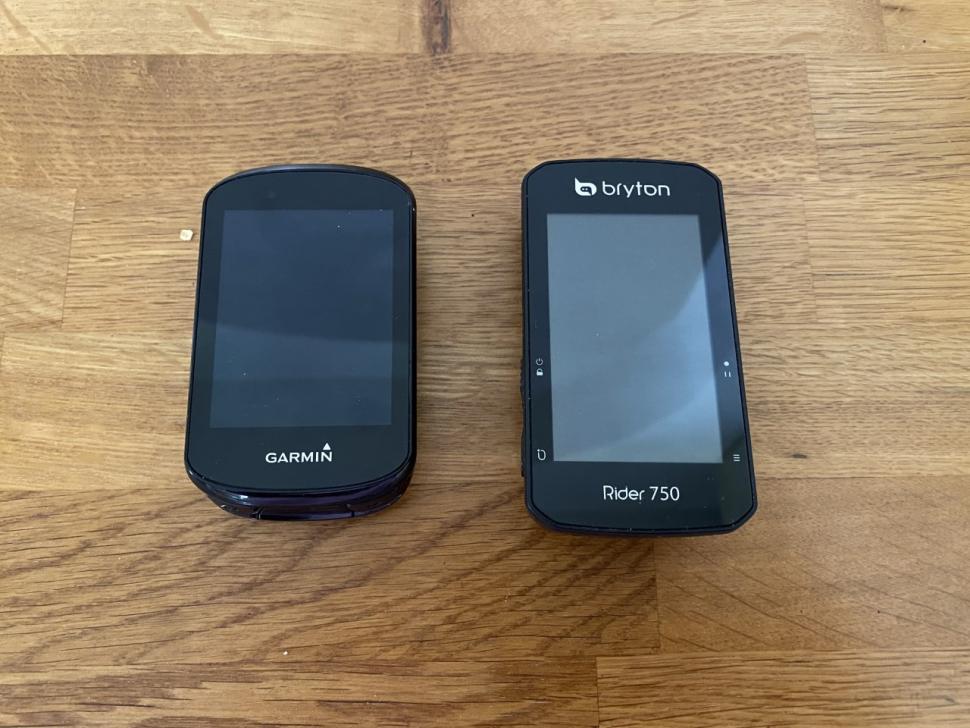

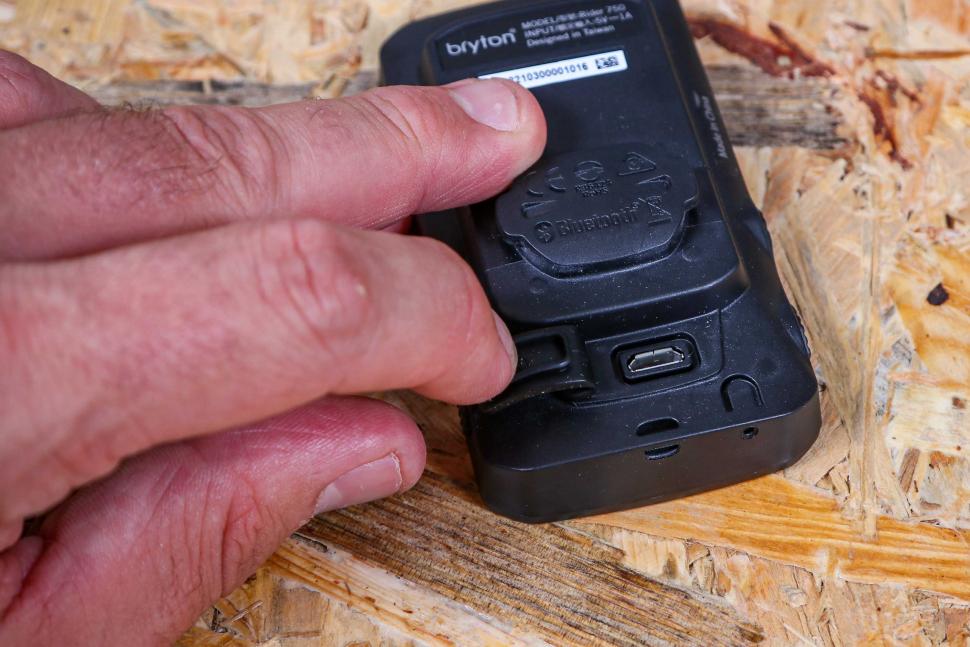
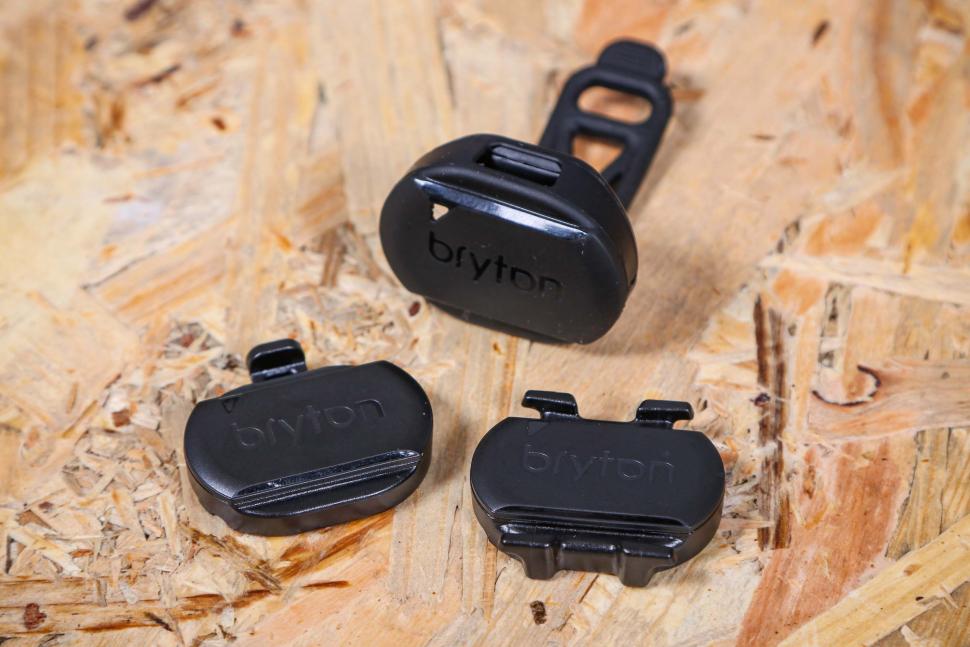
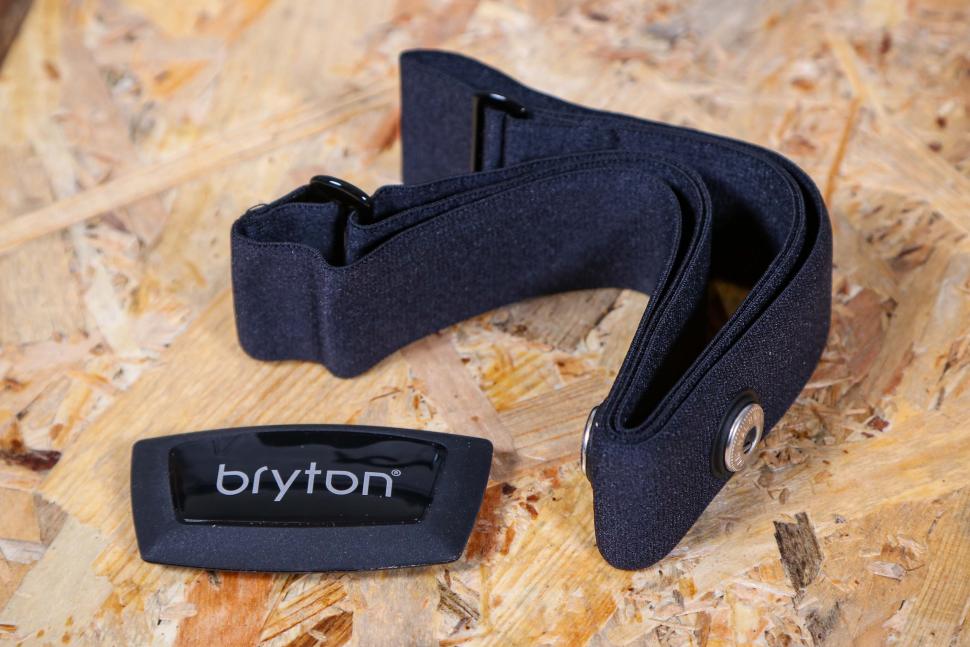

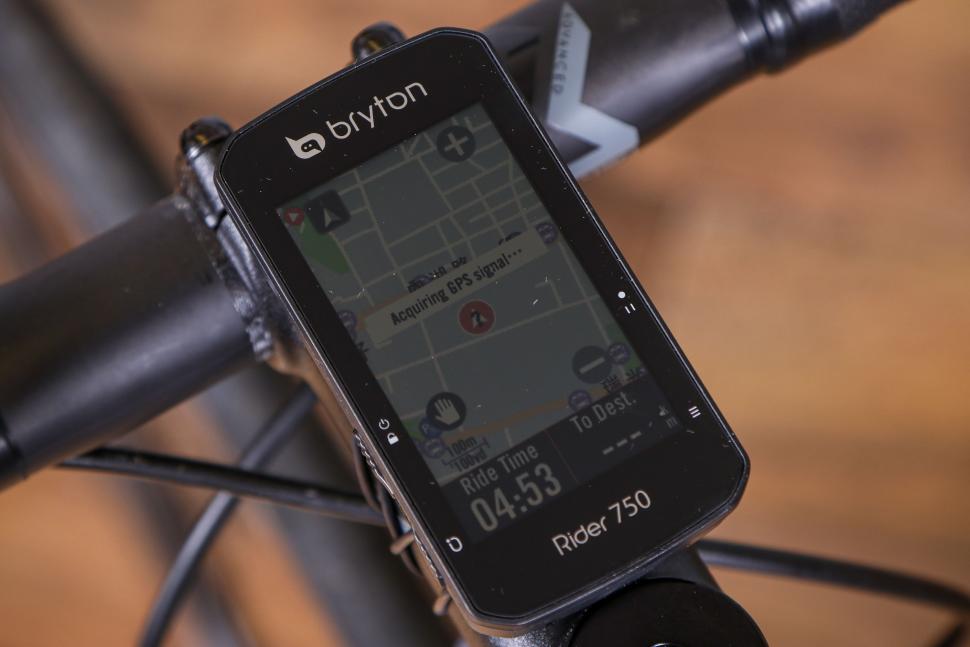

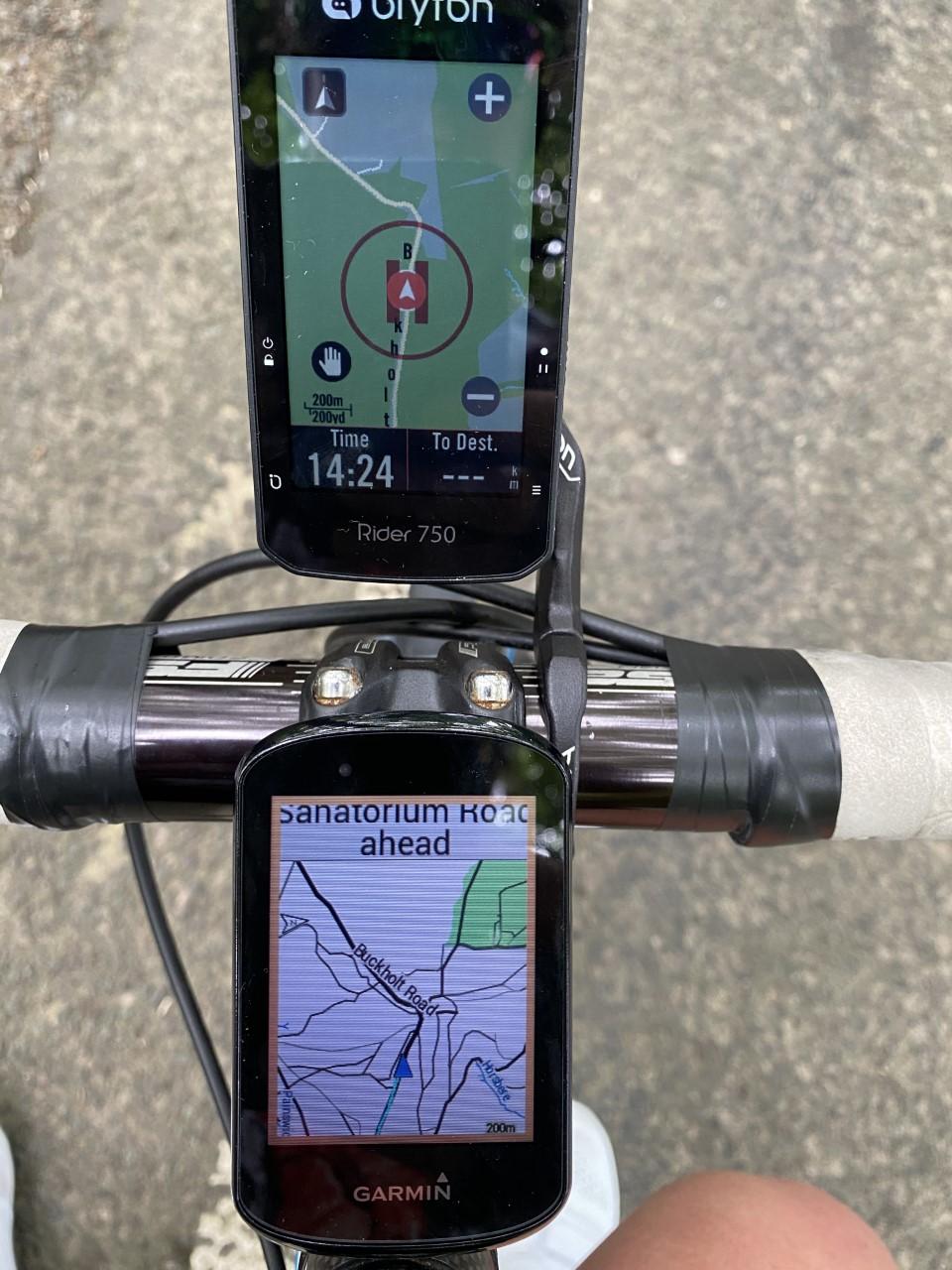
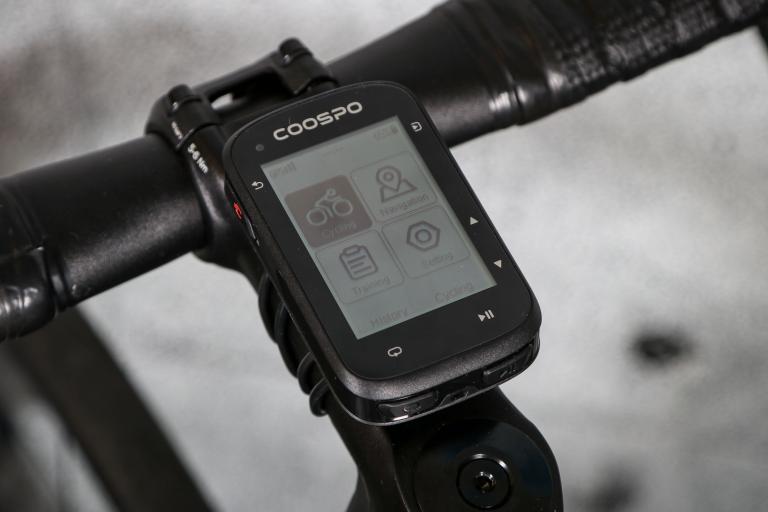
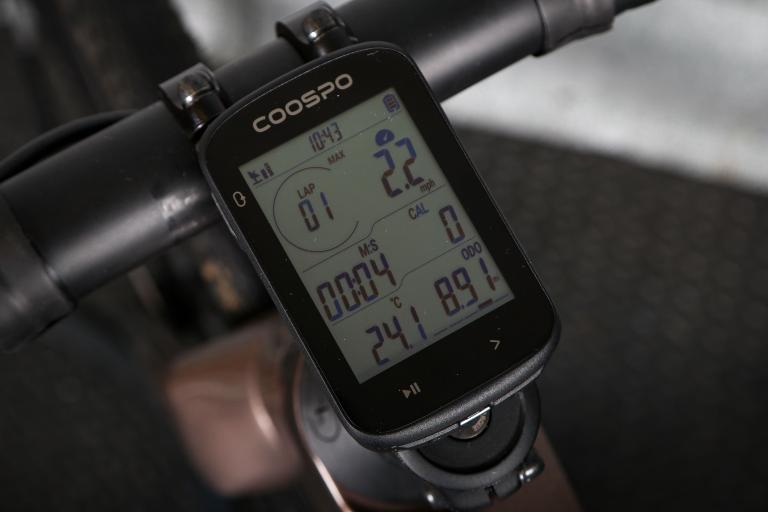
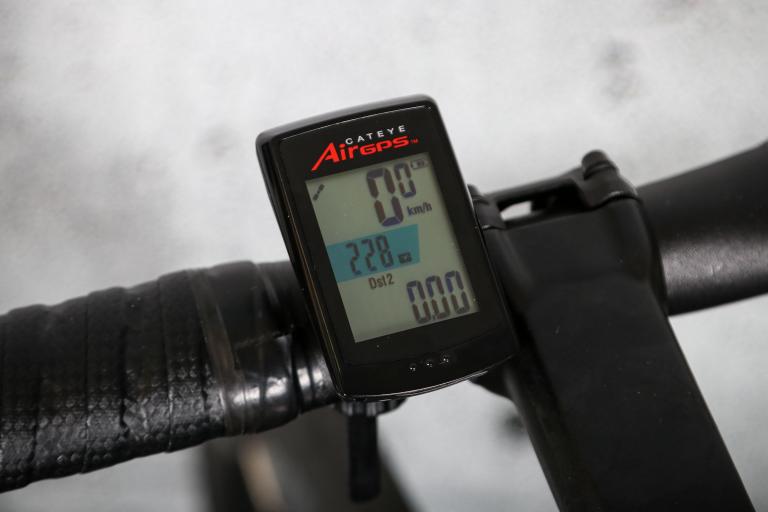

Add new comment
5 comments
Don't buy this gps unit if you want to use it for navigation. It won't navigate anywhere unless your phone app is on and connected (which defeats the purporse of having it), it can only navigate to an address which has to be spoken into it, to program a ride into it you have to have an address (no pin drops).
Also don't buy it if you are not good with computers because there is nothing intuitive about the setting up - although once set up it works well. For instance to get to control power on your smart trainer you go through courses. Who would think of that?
Great screen, gps holding comparable to my old garmin 800, slick mounting bracket but otherwise spend a couple of extra dollars and buy a garmin 830 - which does everything that the bryton won't do.
830 is on offer at amazon for £50 less at the moment.
I've had many Brytons and used a 750 since early this year, used once a week. For the most part the unit was great, however the touchscreen developed a white line and then stopped working, the 'touch' stopped working. Without touch the unit cannot be controlled making it useless. Unfortunately I couldn't find the receipt and got no help from Bryton. Note, I had dropped it whilst taking of the bike to charge, but my previous Garmin 530 had been dropped many times without issue.
I want to like Bryton for giving another option outside of Garmin and Wahoo, but the 750s robustness dissapointed, the screen wasnt' as bright as the 530, and the 750 costs closer to Garmins/Wahoos than previous models. I guess the support dissapointed, no receipt but a unit ID which Bryton could track by, Garmin support has been much better for watches and my Neo.
I'm back to an older Bryton which works great, but not sure I'd buy again, which is dissapointing. I liked having 'another option' in the market, and something different to 'everyone else'.
Had my 750 since release in the UK.... I find it a great unit for the cash, it has worked faultlessly since January 2021. Battery life is good, I hook it up to Lifeline HRM/Speed/Cadence sensors and almost always plan routes on Bryton Active or PlotaRoute.... Never failed yet on navigation a pal with a Garmin lost signal and directions while on a bridleway/gravel ride recently...but the Bryton was all good. I've used it on road and off road rides...with no issues...and Strava segments are not an issue for me as I don't chase numbers....I ride. With all these GPS units...they all have their app/operating methods in different ways... I upgraded from a 450 to the 750...but kept the 450 for backup...time to sell that methinks after a "summer" of cycling with reliable uploads, decent app upgrades and easy map upgrades.... Nice unit...and I'd recommend to anyone..
The £50 extra for a very complete bundle seems good. The RRP for the heart rate band seems to be £60 on its own. I dont think you could do that even with "amazon/ebay special" sensors let alone branded ones.
The live segments is a bit of a miss.
Prices online for the bare head unit seem nearer £220 which creates some clear blue water between the Garmin 830 and the Karoo Hammerhead 2.